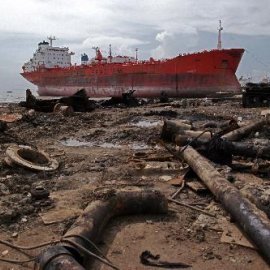Environmental Justice
Environmental justice is defined by the EPA as “the fair treatment and meaningful involvement of all people regardless of race, color, national origin, or income with respect to the development, implementation, and enforcement of environmental laws, regulations, and policies..." However, there are many examples where this is simply not the case, as in the location of landfills, incinerators, sewage treatment plants, etc.--uses with known hazardous and unhealthy impacts which affect the local communities typically inhabited by indigenous peoples, minorities, and the poor. Inequities of environmental justice are not limited to the United States: there are countless similar situations in other countries and at sea where waste and persistent organic pollutants are exported and deposited in the deep ocean away from scrutiny and national regulation. In this episode of World Ocean Radio, host Peter Neill will discuss environmental inequality and a number of organizations around the globe active in this area, including the Environmental Justice Foundation (www.ejfoundation.org).
______________________________________________________________________
Peter Neill, Director of the W2O and host of World Ocean Radio, provides coverage of a broad spectrum of ocean issues from science and education to advocacy and exemplary projects. World Ocean Radio, a project of the World Ocean Observatory, is a weekly series of five-minute audio essays available for syndicated use at no cost by community radio stations worldwide.
Photo credit: Wahid Adnan/Marine Photobank.
Caption: UMA, a chemical carrier ship, is waiting to be cut in a ship breaking yard at Sitakunda in Chittagong, Southeastern Bangladesh. There are many ship breaking industries along this coastal region that contribute a huge amount of environmental pollution.
- Login to post comments



